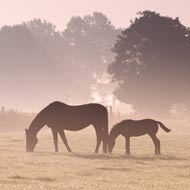
Breeding site closed until further notice
A case of neurological equine herpes has been discovered in the Health Isolation Unit at The National Stud, forcing the breeding site to close.
Staff identified the EHV-1 virus in a maiden filly which was imported from France on 20 January. The horse is fully vaccinated.
Based on the outskirts of Newmarket, the National Stud is home to five stallions including Dick Turpin, Gregorian, and Toronado.
Speaking to BBC Radio Cambridgeshire, managing director Brian O’Rouke said: "This is an isolation unit and we've taken every necessary precaution.
"That one isolation unit is shut down for 30 days automatically. The staff at the unit do not go to the main farm, which is a good mile and a half from the isolation unit.
"We are hopeful that if we have no more setbacks, hopefully with consultation with a team of vets and the Animal Health Trust, we've got a second gate that we might be able to open up the stud in time for the start of the breeding season around 15 February.
"With having 3,000 racehorses on our doorstep in Newmarket, six stallion stations and all those having a lot of mares coming in from overseas and domestically, we have to be seen to set the standard."
The National Stud say that they are now closed to the public until further notice.
In response to the discovery, BEVA quickly issued a statement describing the situation as "a highly infectious disease."
"We have to take every precaution possible and we did that and did it quickly," they said.
"The case and contacts are restricted to the isolation unit which is a long distance from the remainder of the stud. Control measures are being followed in accordance with the HBLB Codes of Practice."



 The RCVS has announced a new version of its 1CPD mobile app, with enhanced features for veterinary surgeons and veterinary nurses to record their continuing professional development.
The RCVS has announced a new version of its 1CPD mobile app, with enhanced features for veterinary surgeons and veterinary nurses to record their continuing professional development.